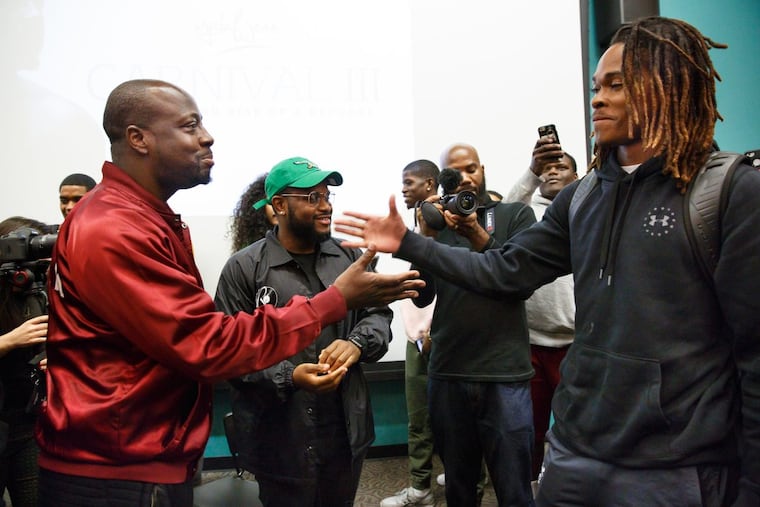Wyclef Jean visits Temple hip-hop class: 'The new innovators are in this room'
He recently released his first album in eight years.

The Grammy-winning artist Wyclef Jean recently released his first album in eight years. On Friday, he shared it with a room full of Temple University students.
It was in Timothy Welbeck's "Hip-Hop and Black Culture" class. The teacher-lawyer often invites artists to speak, and has hosted hip-hop artists such as Lecrae, Chill Moody, and more.
At first, it was hard to spot Jean in the lecture room in Anderson Hall. He blended in with the class, sat in the desks, chatted with the 150-plus students, and posed for a few selfies before taking center stage.
For him, the lecture was crucial.
"The new innovators are in this room," he said.
There was a sign-up sheet for students to receive a free copy of his new album, Carnival IIi: The Fall and Rise of the Refugee, which Jean described as "1997 meets 2017."
Jean is the founder of the iconic hip-hop group the Fugees, which included Pras and legend-in-her-own-right singer Lauryn Hill. In the class, Jean credited the group's success to "their universal vibes."
The Haitian-born musician went on to produce, write, and loan his vocals to hits like Shakira's "Hips Don't Lie," Carlos Santana's "Maria Maria," and Whitney Houston's "My Love Is Your Love."
"Anything I'm composing, the genesis of my thesis is hip hop," he told the class.
In 2010, Jean ran for president of Haiti. Election officials removed him from the race. During that time, Jean said he thought it was because he had not been a resident of the country for five consecutive years.
Before Jean began his hour-long lecture and discussion, Welbeck introduced him as a legendary figure in American music and someone who showcased the beauty of Haiti.
Here are six takeaways from his visit.
Wyclef Jean immigrated to the United States when he was 10.
Jean told Temple students about his humble upbringing — sometimes there was no electricity and he would often ride a donkey to school. When his family arrived in Brooklyn, N.Y, they lived in the Marlboro housing project. He remembers telling his brother, "We made it."
He was a "thug nerd." "I'm sexy to the girls now," Jean said with a laugh, "but not back then."
Compared with his childhood peers, his musical tastes were very eclectic, which would serve him well later in life. "I was just different," he said. "I was in the projects listening to Pink Floyd."
His choice to run for president of Haiti was difficult.
"I didn't leave music because my career was bad," he explained. "I was thinking, 'What's the legacy going to be?' I left and said, 'I'm going to help my people.' It wasn't an easy decision." Jean said politics is dirty, and "they can say anything they want to make it stick."
Though he was removed from the race, he said that after his brief campaign, the "young government was working with the older government. And that's what I want."
What motivated Jean to speak to the Temple class.
"I'm an audio engineer by trade, so passing information is key from generation to generation. For me, every year, I believe in touching [down in] seven or eight schools, and the idea of teaching hip hop in a billion-dollar industry is very important. Hip hop is business, it's marketing, it's invention — I look forward to seeing how the new generation keeps growing.
"The great thing about music is every day, you are a student. The great thing about art is every day, you are a student…. I look at it as, I will leave here and I can see the pulse of what's going on."
Why he decided to drop his first studio album in eight years.
"There's waves coming in and out of the ocean, and I know when to boogie board and when to surf. It's time to surf," he said. "With all of the sonics on the radio and off the radio, the Afrobeats and all of the culture, it just feels like a good time to put music out in a competitive space."
Jean's life lesson for Temple students.
The common thread is Jean's passion for music and Haiti — and for bridging generational gaps. "When we're young," he told the room, "we think we're so powerful and so invincible. We think we don't need older people. History shows that older folks have to pass down the information."
He added, "You have to constantly embrace what comes before and after you."
How did the class end? With a lively rap cypher. Then Jean went to the Bell Tower to perform.